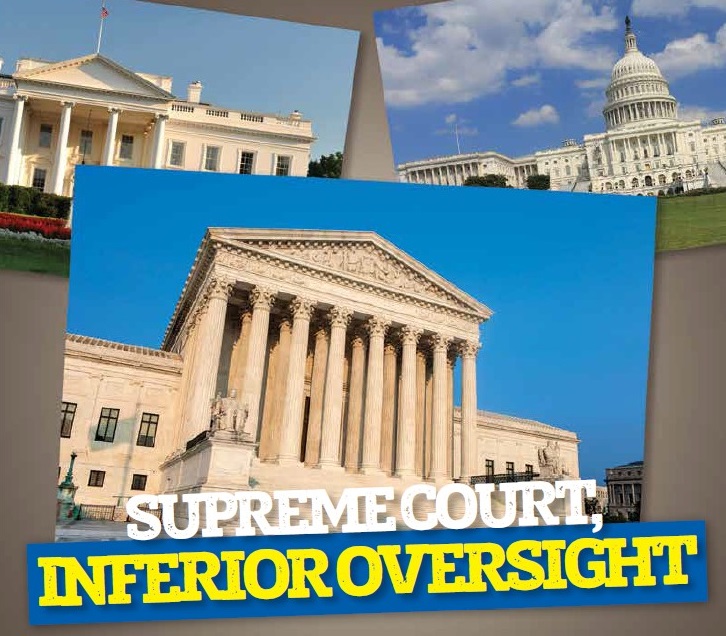Supreme Court, Inferior Oversight: How SCOTUS Lags Behind the Other Branches
*** Read the report here: tinyurl.com/BranchComparison ***
 A new analysis by Fix the Court reveals the extent to which Supreme Court justices follow different, less stringent rules from top officials in the other two branches on issues ranging from how they report stock transactions to how they handle privately-financed travel to whether they may earn outside income.
A new analysis by Fix the Court reveals the extent to which Supreme Court justices follow different, less stringent rules from top officials in the other two branches on issues ranging from how they report stock transactions to how they handle privately-financed travel to whether they may earn outside income.
This lack of third branch oversight, laid out starkly in this report, has left both the press and public wondering about the jurists’ investments, trips and potential conflicts of interest, compelling Americans simply to trust – since we can’t verify – the integrity of the institution and of the individuals appointed to serve there.
“Already this year, with the mystery surrounding Antonin Scalia’s trip to Texas and the backlash following Ruth Bader Ginsburg’s comments on the presidential race, the public has become more cognizant of the unquestionably lax rules for Supreme Court justices,” Fix the Court executive director Gabe Roth said. “An entire congressional hearing last month even focused on the topic. These milestones demonstrate there is bipartisan appetite to ensure the high court is brought in line with modern expectations of transparency and with the next Congress beginning in just five months, the time to act is close at hand.”
To that end, more than highlighting the accountability shortcomings at the Supreme Court, the report suggests ways to bring greater oversight to the Supreme Court. For example:
ON STOCK OWNERSHIP. Officials in all three branches are forbidden by law to have official dealings with companies in which they own securities. Congressional and executive branch officials must also abide by the STOCK Act, which requires them to publicly report stock transactions within in 45 days, but the justices are not subject to this legislation. Solution: Require the justices to follow rules akin to the STOCK Act.
ON FINANCIAL DISCLOSURES. Those of executive and legislative branch officials are easily obtainable online, while Supreme Court and other federal judges must be formally requested and may take up to a month to receive. Solution: Require that justices’ disclosures be placed online.
ON GENERAL OVERSIGHT. Congress has the House and Senate Ethics Committee, and cabinet secretaries and top executive officials are subject to internal protocols and ethics offices. Inspectors general operate in these branches, as well. While federal district and circuit court judges accused of wrongdoing may be brought before a Judicial Council, the justices of the Supreme Court, on the other hand, have no such oversight whatsoever. Solution: Either empower the Judicial Conference or consider appointing a judicial inspector general.
ON TRAVEL. Though all top federal official must make public every trip they take for which they were reimbursed more than $350 for food, lodging, travel expenses, that is essentially all the Supreme Court justices must report. Officials in the other branches have many additional reporting requirements regarding their travel, as well as restrictions on whom they may accept travel from, and lower federal judges must get pre-approval for traveling to certain seminars. Solution: Real-time reporting of justices’ reimbursed travel.
ON A CODE OF CONDUCT. While there are a number of statutes that generally guide conduct across the federal government, each branch supplements these laws with a code of conduct, though the justices do not. Solution: Require the justices to create their own code of conduct.